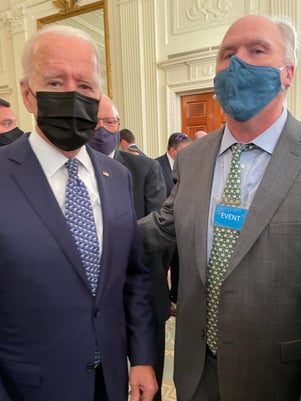President Biden fulfills campaign promise to the Insulators
Insulators Union Government Affairs — Tue, Oct 19, 2021 @ 11:10 AM
“Hurry up and wait,” is a common construction concept, but this phrase also often applies to the legislative process.
Since the introduction of the GREEN Bill (H.R. 848) in the U.S. House in early February, we have known that mechanical insulation tax incentives would be included in the congressional clean energy tax legislation. We have also known for some time that the U.S. Senate approach to clean energy tax legislation would be different.
As both congressional chambers work on clean energy tax legislation, President Biden and his Administration can greatly influence the direction of federal legislation.

I am pleased to report President Biden has put his thumb on the scale for mechanical insulation tax incentives.
When the formal Biden Administration budget documents for fiscal year 2022 were presented to Congress, President Biden’s budget contained the details for his American Jobs Plan infrastructure proposal. True to his commitment that he made to the Insulators last summer as a presidential candidate, President Biden’s American Jobs Plan contains mechanical insulation tax incentives that mirror the incentives contained in the
GREEN bill.
With support from President Biden and the U.S. House, what happens next? We wait for Congress to complete its work this fall on infrastructure legislation.
Infrastructure legislation – It’s complicated
For now, we wait on the enactment of infrastructure legislation, which will require congressional approval on three separate legislative proposals.
The first bill is the Bipartisan Infrastructure Framework President Biden negotiated with Senate Democrats and
Republicans. This legislation contains historic investments in traditional transportation infrastructure, and some clean energy provisions. However, it does not include mechanical insulation tax incentives.
The second proposal is the budget resolution that contains the framework for federal spending and will
contain instructions for congressional committees to develop specific legislative proposals. The budget resolution will require the support from House and Senate Democrats, but does not require President
Biden’s approval.
The third bill is the budget reconciliation proposal that will include the specific legislative proposals as
directed from the budget resolution. We expect mechanical insulation incentives will be included in the House budget reconciliation bill.
The budget reconciliation bill will also include many of President Biden’s American Families Plan priorities for
human infrastructure.
The U.S. Senate approved the Bipartisan Infrastructure Framework bill on Aug. 10 and the Senate budget
resolution on Aug. 11.
Speaker Pelosi stated the U.S. House will consider the Bipartisan Infrastructure Framework legislation only after the Senate has also approved its Senate budget reconciliation bill.
The Insulators strongly support the enactment of both the Bipartisan Infrastructure bill (that passed on a 69-30 vote in the Senate) and the budget reconciliation legislation (that can be enacted with 50 Senate votes).
Any differences between the House and Senate Bipartisan Infrastructure legislation and also the budget reconciliation legislation will be resolved in House-Senate conference committee negotiations.
We have much work to do to ensure mechanical insulation tax incentives are included in the final version of budget reconciliation. You can expect that all HFIAW members will be asked to contact their U.S. House and Senate members in the fall to encourage support for mechanical insulation tax incentives.
We will also work closely with the Biden Administration so the President’s priorities, including mechanical insulation tax incentives, are secured in the final version of budget reconciliation legislation.
In both the Bipartisan Infrastructure legislation and the budget reconciliation, we are working to ensure all U.S. federal infrastructure investments (both direct funding and tax incentives) contain essential building trades labor standards such as Davis-Bacon Prevailing Wages and the requirement for the use of registered apprentices.
With th
e conclusion of the Summer Olympics, I see these legislative proposals in a similar way as the Olympic
triathlon event that requires swimming, bicycling and distance running. We have started well, but we need to
finish well.
We will continue our work to ensure President Biden and Congress cross the finish line to enact these
infrastructure proposals and deliver on this transformative moment to Build Back Better.
Mechanical Insulation awareness webinar
In addition to our progress to secure support for mechanical insulation tax incentive legislation, we continue our posi
tive efforts to increase mechanical insulation awareness.
On July 27, the Insulators Union, contractor trustee leadership and our Insulators LMCT leadership team partnered with the Building Action organization to host a webinar on Financing Better Buildings. The event focused exclusively on the energy, economic and environmental benefits of mechanical insulation, and the need for tax incenti
ves to promote our energy efficiency technology.
Insulators General President Revard served as the co-host for the webinar, General Secretary-Treasurer Gamble participated on an expert panel with Insulators LMCT Contractor Trustee Tom Dake, II. LMCT Deputy Director Gina Walsh served as the webinar moderator. The webinar also featured a presentation from Rep. Linda Sanchez (D-CA), the leader of mechanical insulation legislation in the U.S. House.
We have such a great narrative to share about the benefits of mechanical insulation, and our leadership did
a superb job telling our story. I was encouraged to see Department of Energy officials participate on the webinar, as well as leading energy and government policy organizations.
I strongly en
courage our members to watch this effective presentation of mechanical insulation that is posted on both the Insulators International and Insulators LMCT websites.
We have done our work to advance mechanical insulation incentive legislation. Now we wait for our federal elected officials to do their work.